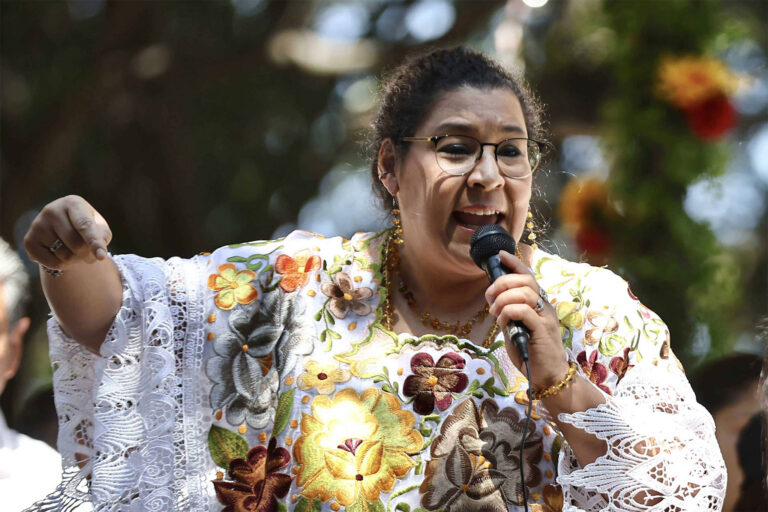THE TRUMP DOCTRINE
This column by José Luis Granados Ceja originally appeared in our weekly newsletter, the México Solidarity Bulletin. We encourage you to subscribe.
President Donald Trump has dramatically reshaped how the United States (US) exercises its soft power, which is Washington’s ability to influence other nations through persuasion rather than coercion or force.
With cuts to foreign aid programs and withdrawals from international agreements, he appears to be shifting away from the traditional diplomacy and global engagement practiced by previous Republican and Democratic administrations alike.
But it would be incorrect to assume that just because of Trump’s nationalist tendencies, he’s shifting to a retreat from US involvement in global affairs. Rather, he’s merely changing his strategy, intending to maintain US hegemony and imperialist dominance by other means.
His strategic shift forms a part of the Trump Doctrine that includes skepticism about multilateral institutions, wielding economic leverage like tariffs to achieve foreign policy goals and a transactional approach to diplomacy, driven by an “America First” perspective that places US interests above all.
The trouble with Trump and his transactional diplomacy for countries around the world is that the US president brazenly lies.

Drop Site News recently reported how the US pulled a fast one on the Palestinian people. The Trump administration envoy Steve Witkoff promised Hamas that in exchange for releasing US-Israeli soldier Edan Alexander, the US would compel Israel to lift the Gaza blockade and initiate a ceasefire.
According to Basem Naim, a member of Hamas’s political bureau, the US immediately broke the deal following Alexander’s release. Instead, on May 18, Israel commenced airstrikes and its largest ground offensive in Gaza since March.
In early 2025, US envoy Richard Grenell negotiated an agreement with Venezuela to resume deportation flights of Venezuelan migrants from the US to Venezuela. The deal also called for releasing six imprisoned US nationals.
However, this agreement unraveled when the Trump administration revoked Chevron’s (the oil and gas company) license to operate in Venezuela. This new economic sanction prompted the Maduro government to halt the deportation flights in protest.
Trump is able to get away with false promises because the US government has a bipartisan imperialist consensus: any demonized government or organization, like Venezuela or Hamas, does not deserve honest and good faith negotiations.
Worse still, despite their distrust of Trump, negotiators from other countries find themselves forced back to the table. Palestinians and their political representatives will surely find themselves negotiating again with the US when they seek some reprieve from the Zionist entity’s genocidal campaign.
In the case of Venezuela, the Maduro government has already reestablished deportation flights with the US.
This is the Trump Doctrine: send envoys, promise anything to get a deal, and break the deal as soon as he gets his way. The US has never been a trustworthy partner, but Trump’s shameless penchant for dishonesty descends to a new low — every country should take nothing his representatives say across the table as reliable.
It’s vital for the Mexican government to understand the central role of this dishonesty in Trump’s approach to foreign policy. Perhaps no other country, save Canada, is as exposed by Trump’s lies as is Mexico, given its proximity and reliance on commerce with the US.
President Claudia Sheinbaum has delivered a master class in managing Trump thus far. She negotiated her way out of tariffs on Mexican goods on several occasions. But with 2026 USMCA negotiations right around the corner, she may need to deploy the Plan B she undoubtedly has in her pocket, given that Trump is capricious, willful, and untrustworthy.
Hawks inside the Trump administration are champing at the bit to engage in unilateral military action inside Mexico. Trump’s use of “soft power” has the threat of “hard power” behind it, kept on a short leash. More than ever, Mexico should orient its foreign policy away from the unreliable US and look instead to the Global South.
-
Let’s Talk About Migration: Trumpist Persection
Millions of women who have endured unspeakable violence on their migration journey are now being persecuted in the United States by an extremely xenophobic and misogynistic government, led by Donald Trump,
-
Genocidal & Extractive Capitalism
This week, the United States claimed to be negotiating to avoid war with Iran. It was merely a cover for a new attack. Where are the efforts to stop it?, asks Mexican Supreme Court Minister Lenia Batres.
-
Trump Will Not Take Our Oil
Venezuela’s oil belongs to the Bolivarian Republic. Mexican oil belongs to the people of Mexico. If the current administration decides to trade it with Cuba or any other country, it has every right to do so. Mexican oil does not belong to the US nor to Donald Trump.




